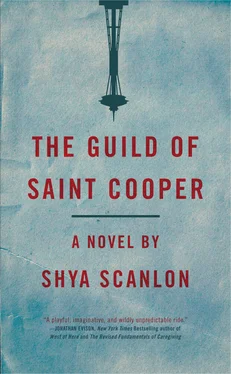My mother, sitting to Crystal’s immediate left, reached out and took her hand. My mother felt terrible about her being here — she felt terrible about all of us being here, but especially Crystal. She’d been through a lot. Crystal’s father had been abusive, and she’d left home when she was fourteen, getting her GED at sixteen and putting herself through college. She was somehow both strong and fragile. When my brother married her, I hadn’t been able to shake the sense that, although we were only two years apart, Kent’s experience growing up must have been fundamentally different than mine.
Crystal stood.
“If a place itself is insane,” she said, “can there be an insane reason to leave it?” She left the table to join her daughter in the living room, leaving the rest of us to acknowledge the truth of her statement. It was pretty heavy-handed but not entirely unfair.
“Anyway,” I said.
My mother, still holding the large bud, put it to her nose and inhaled deeply.
“It’s sweet,” she said. “I mean, it smells sweet.”
“You were right,” Kent said, looking at me. “Brock’s a kind man.”
“That’s the pot calling the kettle black.”
“It was just a token of his affection,” said my mother.
We all looked at Blake. She gritted her teeth, didn’t like to be put on the spot like this, but would usually deliver. “A parting gift before he blew this joint?”
We heard the door slam, and turned to see that Crystal had taken Olivia and left through the front door. My brother stood, apologizing, and went after her. My mother began to say something but was interrupted by a sharp popping noise followed by a receding, crackling hiss. I looked at the radio, the harmless brown box of it, and wondered what we’d let into our home.
“Hey,” my mother said, twisting in her seat to see it. “Pipe down.”
KENT WAS ON THE roof with his shingle scraper, and though we’d taught ourselves the technique together just that morning his execution was already expert. He rammed the rod forward and up, and the shingles seemed to fall away easily, cooperatively. Mine suffered from separation anxiety, the nails screaming as they were yanked from the plywood underneath. In the distance a helicopter made broad circles above what may have been downtown Ballard, filming. I looked farther south and counted one, two, three, four others in sight.
“This must be what it’s like to live in a ghetto,” I said.
“Yeah,” said Kent without looking up. “I’m sure it’s exactly like this.”
I sent the scraper back up underneath a row of shingles and pried. “I used to come up here and lie in the sun once in a while. I had to bring the hose up to scare away crows.”
“Mom got attacked a few weeks ago — she tell you?”
“By a crow? No. Like, dive-bombed?”
“Drew blood.”
“Jesus, no, she didn’t mention it.”
I peeked over the front edge of the house to where my mother was standing in the yard, looking down.
“You got attacked by a crow?” I called. “Why didn’t you tell me?”
She’d decided that morning to, as she put it, “tame the yard,” and had been out front all morning pulling up weeds.
“I told your brother.”
“Right.”
She looked up at me. “I’m sorry, Blake. I will make a point of telling you next time a crow pecks me in the head.”
Fred came out of his house with a pair of clippers and began pruning the rhododendron beside his front porch. A few days ago, men from Weyerhaeuser had been canvassing the neighborhood regarding rhododendron growth and, when permitted, spraying each plant with something they explained would protect it from an invasive species of worm. Since then Fred’s rhody had gone through a growth spurt.
“We’re going to tame the yard!” I called.
He looked over, expressionless. “You are, are you?”
“Is that sarcasm I hear?” asked my mother.
“Not at all, Rose.”
I’d often wondered what our family’s reputation had been on the block. The overly permissive parents with kids running wild? The remote, cerebral family who left their property to devalue in pursuit of tragic professions like public policy and social justice? The technicians always experimenting with the newest parenting techniques? It all stuck.
“Well, you’ll see,” my mother said. “I’ve got big plans for this property.”
Fred nodded. His listless clipping made me suspect he’d come out just to listen in on our conversation.
“Ever been attacked by a crow?” I called.
He rested his clippers on top of the dense bush. “I was attacked by a chicken once.”
My brother paused to listen.
“It was guarding a gas station I was supposed to tear down. This was in Kyrgyzstan. They keep chickens as watchdogs over there — crazy, muscular birds that can take out a snake. The family who ran the station was gone, but they’d left this chicken. We were slated to cap the tanks and remove the pumps, so I’m walking the property and the thing comes flying off the top of a stack of tires, right at my head, screaming like some kind of…It scared the shit out of me.”
“What happened?” asked Kent.
“My translator whacked it with a shovel and we ate it for lunch.”
“No shit.”
“Little fucker was tough as nails. Sour, too.”
My brother had always respected Fred. He was a single man, never married, and I think Kent saw something brave or righteous in that.
I wedged my scraper into the gutter and eased my way down to the ladder. “Want anything?” I asked Kent.
He gestured at the roof. “Yeah,” he said. “Help.”
From inside the sound of shingles being pried up seemed deeper, almost painful. I could feel it in my teeth. Blake was reading USA Today —the only major paper we could get — and the rate at which she was turning pages suggested she wasn’t actually reading. A large tangle of shingles fell past the window, briefly blotting out the blue sky. Blake put the paper down.
“Two,” she said.
I yawned. “Two what?”
“There are two articles in the entire paper about what’s going on here. And one of them? A style piece called ‘Must-Packs For Your Next Evac.’ I’m not kidding. I wish I was kidding, but I’m not.”
She showed me the article. The picture showed a suitcase laid out flat and filled with neatly labeled clothes, a photo album, and a first-aid kit. The caption reminded readers that emotional needs were just as important as physical ones. I put my head in Blake’s lap and looked up her nose. “Are you saying you wouldn’t pack your photo album?”
She looked down and pretended to gather saliva.
“That’s USA Today .” I sat up. “What do you expect?”
“Excellence!”
My phone rang: Money , by the Beatles.
Blake got up and found my phone in the pocket of a jacket slung over the back of a chair. “I hate that ring,” she said. She tossed it to me and left the room. It was yoga time.
“Nancy,” I said, “let me guess.”
“You’d never.”
Nancy was my agent, and it had been a relatively thankless job so far — the one book she’d been able to place, Forecast , hadn’t done well, had barely sold, and the one I’d written since had been “too personal.” It was on her recommendation that I’d begun the current book — a return to the big, sprawling fantasia of the first.
“Let’s see,” I said. “They’re pulping all remaining copies of Forecast , and I’m barred from ever entering Barnes & Noble again.”
“Blake.”
“I won the Guardian award for worst sex scene, and I’m barred from ever entering my wife again?”
Читать дальше












